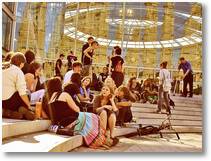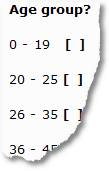 I'm watching with interest on Twitter the unfolding discussion about the decision by the South Australia Department of Education and Children Services to ask for the closure of Al Upton's class blogs (the miniLegends).
I'm watching with interest on Twitter the unfolding discussion about the decision by the South Australia Department of Education and Children Services to ask for the closure of Al Upton's class blogs (the miniLegends).

The miniLegends blogs were written by 8 and 9 year old students in Al Upton's class as part of their learning. Last year Al invited international edubloggers to offer to mentor members of his class by leaving positive comments on their individual blogs.
Sue Waters suggests the order to close the blogs was due to parental concerns over use of young people's photos:
What happened was a few parents became concerned over the use of student images on blogs and potential for cyberstalking because global adult mentors were interacting students. Al had followed all the right procedures and obtained parental consent.
Whilst ensuring young people's protection from significant harm is crucial, the United Nations Convention on the Rights balances protection, provision and participation rights – and as I watched the issues unfolding this morning I thought I should take a look to see what the convention might have to say. So, here's Article 13 from the UNCRC.
Article 13 (Freedom of Expression)
1. The child shall have the right to freedom of expression; this right shall include freedom to seek, receive and impart information and ideas of all kinds, regardless of frontiers, either orally, in writing or in print, in the form of art, or through any other media of the child's choice.
2. The exercise of this right may be subject to certain restrictions, but these shall only be such as are provided by law and are necessary:
(a) For respect of the rights or reputations of others; or
(b) For the protection of national security or of public order , or of public health or morals.
Australia is a signatory to the United Convention on the Rights of the Child. It would be interesting to see how the Committee would respond to the sorts of limitations on young people's expression and information seeking that are becoming all to common because of parental or policy makers irrational fears of the unknown*.
(*I'm not saying all fears are irrational. There are rational fears and concerns. I'm only worried about the cases where fears that are actually irrational (i.e. don't stand up to rational scrutiny) are causing problems.



.jpg) Reason #1: Relevance . We don't generally get 6 year olds to fill in surveys. And indeed, if your survey is about insurance product choice then I would suggest you're right to avoid burdening a child with questions about attitudes towards fiscal risk.
Reason #1: Relevance . We don't generally get 6 year olds to fill in surveys. And indeed, if your survey is about insurance product choice then I would suggest you're right to avoid burdening a child with questions about attitudes towards fiscal risk.